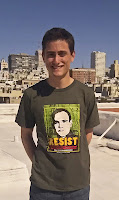“A partisan came in and said, ‘What do you think?’ And I said to myself, ‘My family was murdered. I am in the partisans. I’m alone. I won’t be living here anymore. The Nazis occupied my father’s house that he built himself.’ And I said to the partisan, ‘Burn it!’”
– Faye Schulman.
When interviewed by the Jewish Partisan Educational Foundation (JPEF) at her current day home in Toronto, Canada, Faye Schulman, the only known Jewish partisan photographer, shared this story behind her photograph of her charred family home. Almost every one of Faye’s photographs and personal captions in the traveling photography exhibit, Pictures of Resistance: The Wartime Photographs of Jewish Partisan Faye Schulman, move me to tears. The tears, however, do not come only from a deep feeling of sadness for the tragic losses of the Holocaust, but from a stirring sense of pride, as well, for the bravery of those who resisted.
Due to her photographic skills, Faigel “Faye” Lazebnik Schulman was one of only 27 who were spared when the Germans liquidated the Lenin ghetto on August 14, 1942 and killed 1,850 Jews. They forced Faye to develop and print photos of their aggressions, including the picture of her parents’ mass grave. When ordered to train a young Russian apprentice in photography, Faye realized that she would soon become “useless” to the occupiers, and that they would kill her too. Thus, she escaped to the woods, but not before protecting the lasting proof of their atrocities. She hid the photos of the Lenin ghetto massacre in the middle of a box of unexposed photographic paper and told the young apprentice, who knew little about photography, that she must never expose the box to the sun. Later, as a member of a Russian partisan brigade, Faye came back on a mission and recovered both the photos and the camera that she would carry with her throughout her two and a half years in the woods – and to this day.
It was not easy to become a partisan, especially for Jewish women. Though she had no training whatsoever, the fact that her brother-in-law had been a doctor won Faye acceptance into the Molotova Shish Bridage’s Detachment as a nurse. Luckily for her, there was a great need amongst the partisans for nurses and doctors. Faye explained, “The main part of being a partisan was not the killing but keeping the wounded alive, bringing the wounded back to life so they could continue fighting and bring the war to an end.”
Faye volunteered often to go on dangerous raids in order to replenish her photographic supplies. With her camera, she captured experiences that most of us have never and, hopefully, will never even be able to fathom. Her photos range from images of Jewish partisans being buried next to Russian partisans and honored for their brave deeds to defeat a common enemy to that of a young girl whom Faye saved. Some of the pictures are quite serene and artistic. For example, the one of Faye in a canoe with a man in partisan uniform. Were it not for Faye’s narration of the photograph included in the caption, one would never know that Faye and the man were about to embark on a dangerous mission from which the man would not return.
You must see her photographs yourself, for my words cannot do the images justice. Thirty of Faye’s exquisite photographs are displayed in Pictures of Resistance: The Wartime Photographs of Jewish Partisan Faye Schulman, which was produced by JPEF and curated by the well-known Jill Vexler, Ph.D. It is currently on exhibit at the Dallas Holocaust Museum until November 26. To learn how to bring the exhibit to your community, visit www.jewishpartisans.org/exhibit or e-mail exhibit@jewishpartisans.org.
There are no other known Jewish partisan photographers. When I learned that Faye had to bury her camera and come back for it alone, develop the pictures under a blanket in the night, and lug her pictures with her while running from the Nazis, it was no wonder that she was perhaps the only one to capture the partisans’ experiences on film. In the woods, surrounded by enemies, during unforgiving winters, partisans struggled just to survive, let alone steal chemicals on raids to take pictures! Without her determination, the world would never have seen these images.
As she said, “I want people to know that there was resistance. Jewish people didn’t go like sheep to the slaughter. If they had the slightest opportunity to fight back, they did and took revenge. Many lost their lives heroically. I was a photographer. I have pictures. I have proof.”
– Lisa Block








 Over 89% of educators who have take a
Over 89% of educators who have take a 
